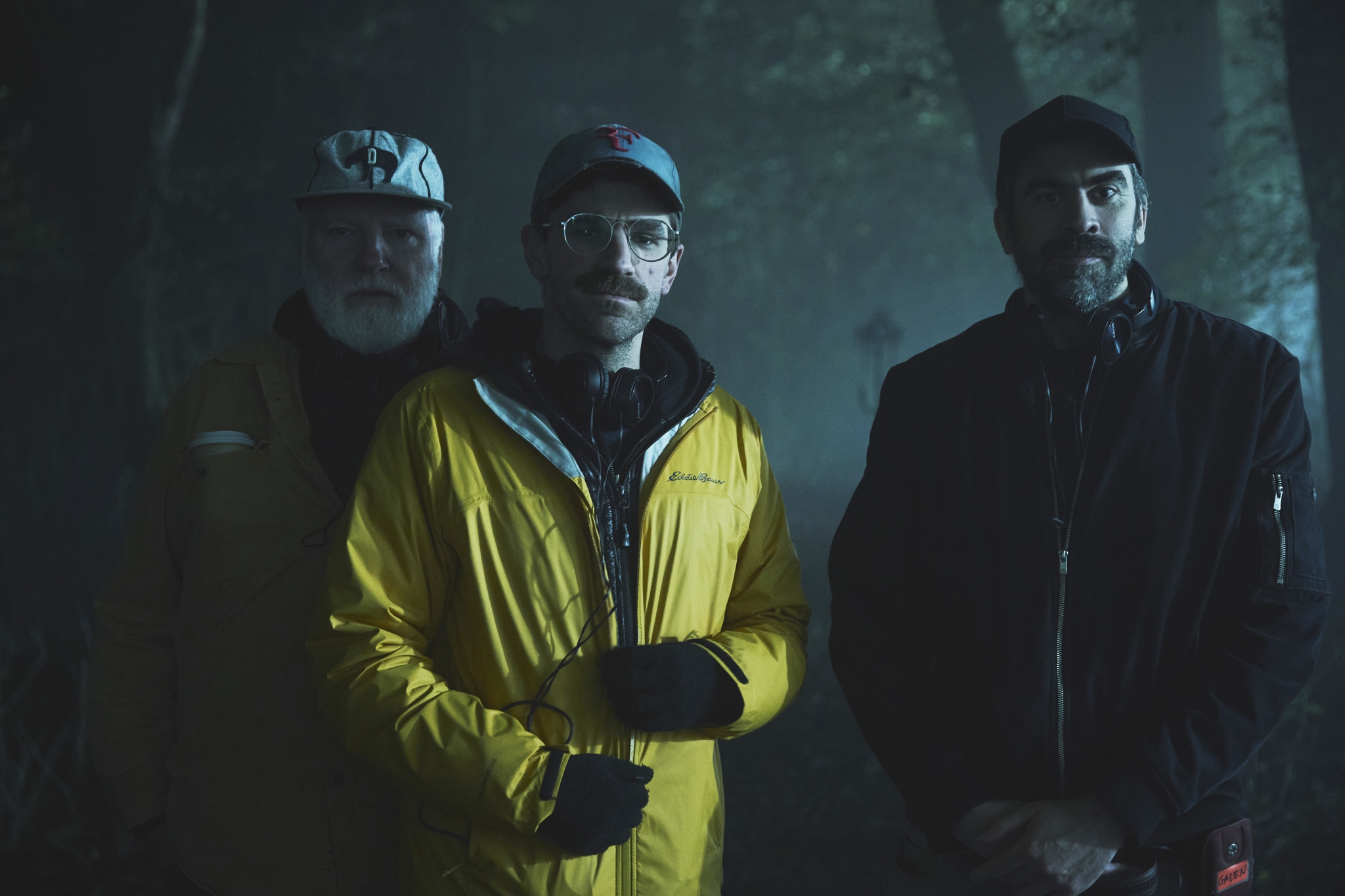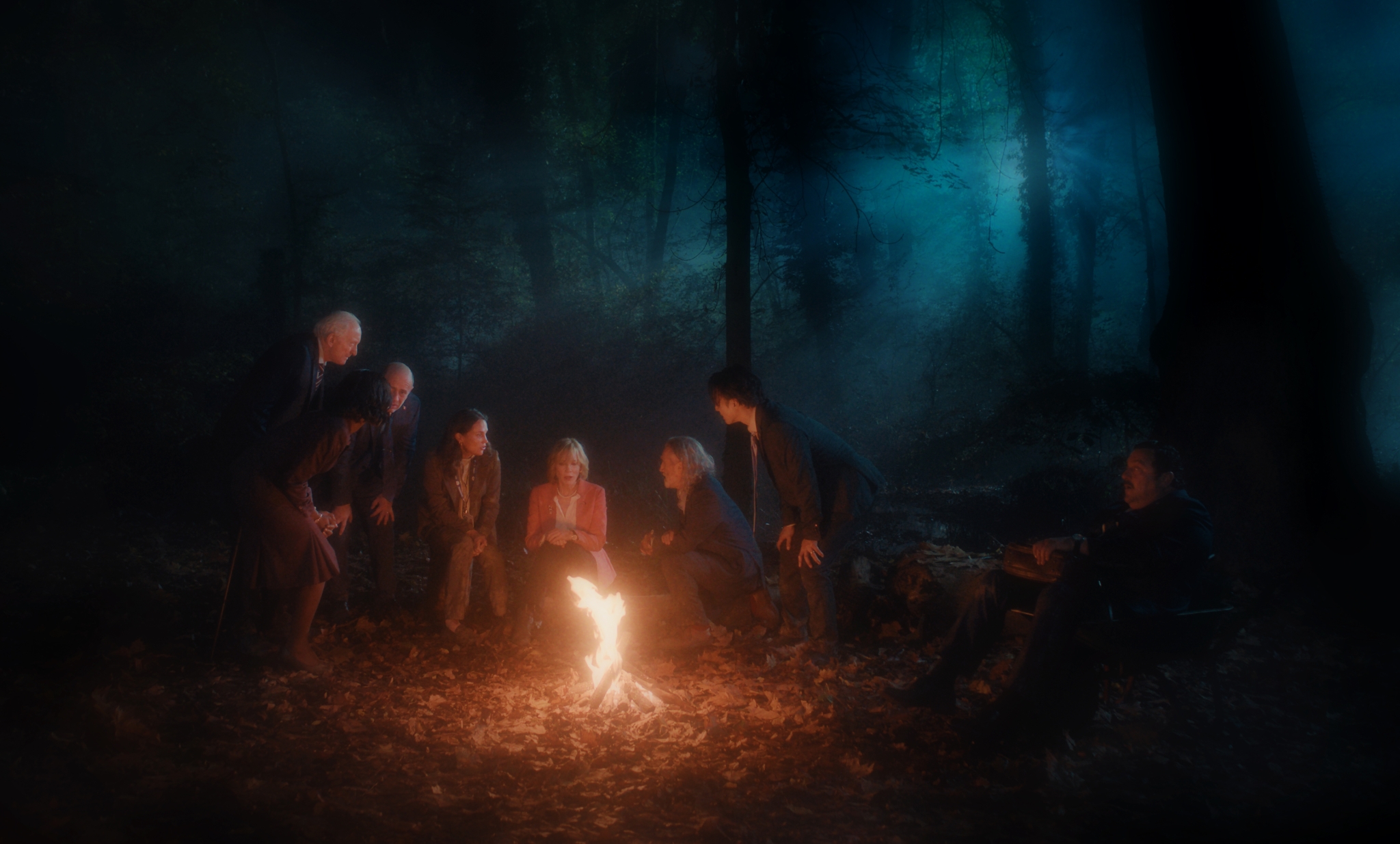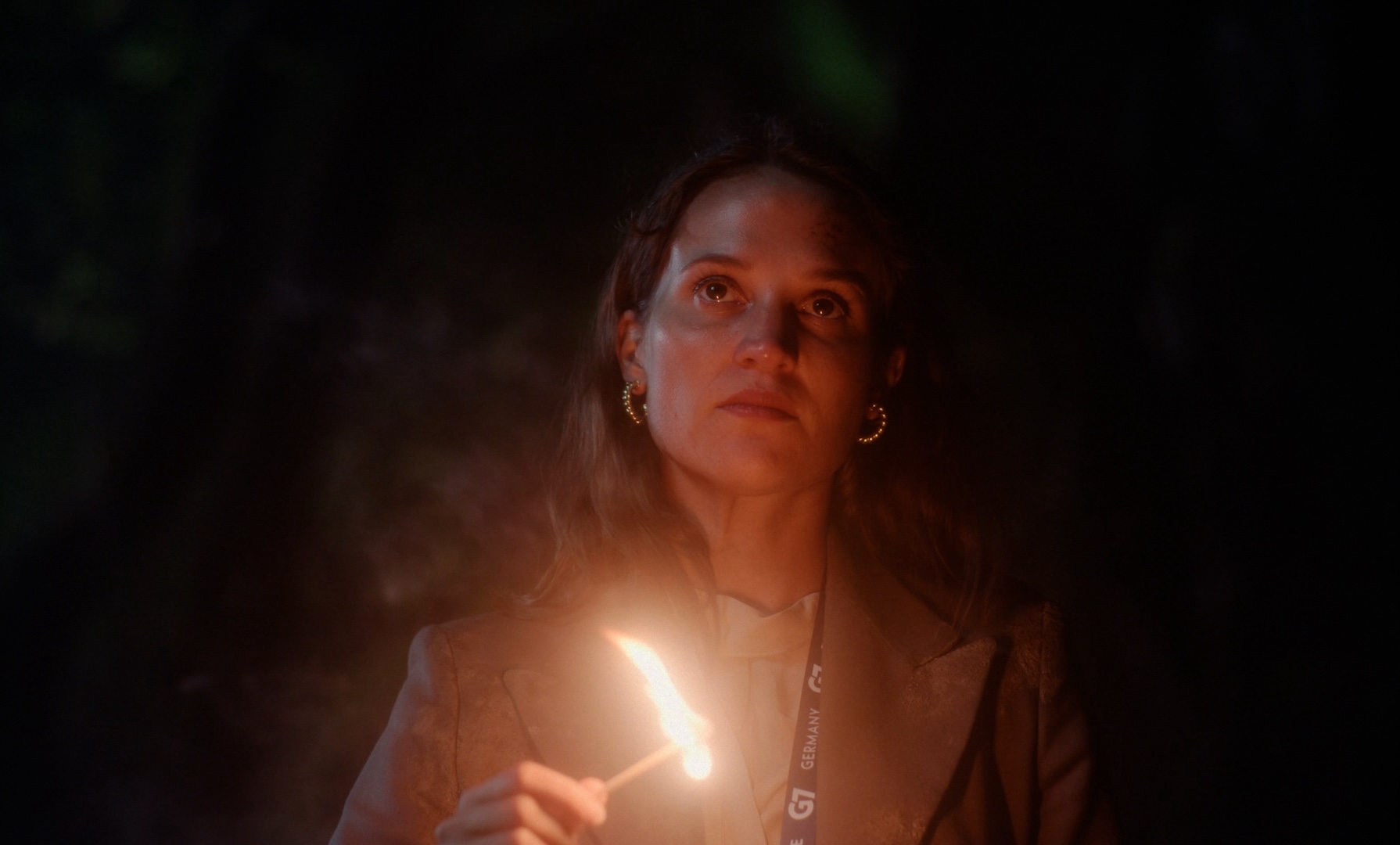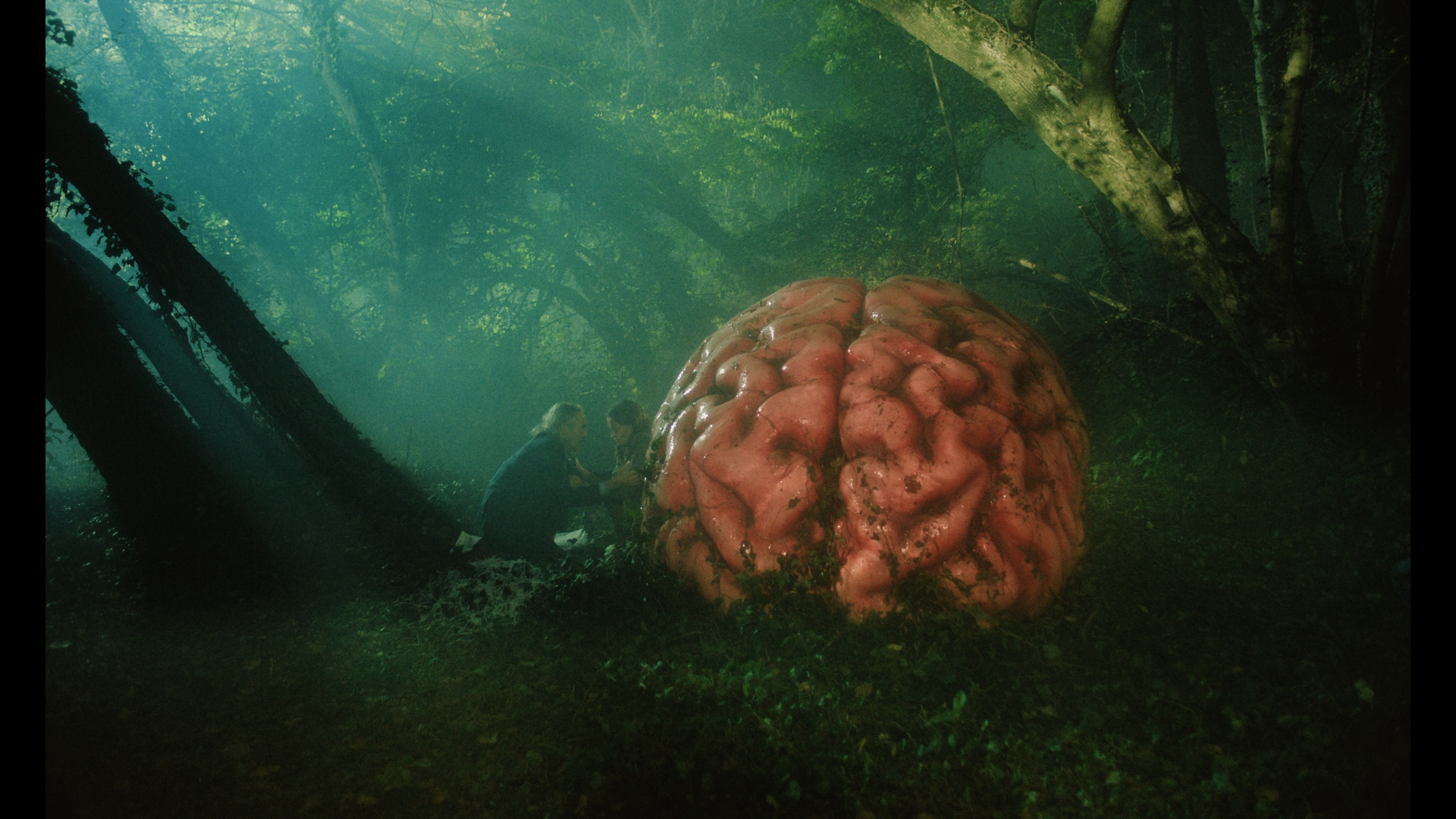

The acclaimed Canadian filmmaker talks new film Rumours, Chat GPT, and alienating audiences with co-directors Evan Johnson and Galen Johnson.
“I want to amuse posterity”, says Guy Maddin. “I want to amuse some future “wide audience.””
We’ve spent the last ten minutes discussing audiences, a topic which, the experimental filmmaker jokes, seems to have struck a nerve with him and co-directors Evan Johnson and Galen Johnson, who sit on either side of him. “During this movie we enjoyed conceiving of “audience alienating” ideas.” Evan adds. “It’s fun to think about ways we can alienate or even lie to the audience about what the movie is really doing or what it’s about—to trick them.”
Maddin has been playfully alienating audiences for decades now, though all the while amassing a dedicated cult of film fans in the process. A master of experimental cinema, his movies My Winnipeg, The Forbidden Room, Seances and The Green Fog, among others, have become famous for their unique ability to honouring and indeed preserving the cinema of the past while taking advantage of the medium’s inherent limitlessness, which, Maddin argues, is often overlooked. “I want [students of cinema] to be as open minded as film as they would be forced to be about painting—with painting you’re allowed to use any size brush you want, or even just throw your paint on the canvas. I want people to look at film the same way, with the idea that the director has more options than the industry often presents.”
His latest, Rumours, which he co-directed with frequent collaborators Evan and Galen Johnson, is a change of pace for the filmmaker, though maintaining the surrealism that has come to characterise his authorship. The film features a staggering ensemble cast of the likes of Cate Blanchett, Alicia Vikander, Charles Dance, and fellow Canadian Roy Dupuis as world leaders who find themselves stranded at the annual G7 summit.
Below, Maddin, Evan and Galen discuss Rumours, Chat GPT and the art of alienating audiences.

A still from Rumours (dir. Guy Maddin, Evan Johnson and Galen Johnson).
Luke Georgiades: How was the London Film Festival screening of Rumours? Did you find a British audience responded to the film in the ways you were hoping for?
Guy Maddin: It’s maybe the best response we’ve had? LFF felt really great.
Galen Johnson: It helps that you have your two big movie stars there to hype everyone up.
Evan Johnson: We had some friends there, we didn’t pay them to show up and laugh really loud but…
GJ: There may have been some performative laughter.
LG: Is there an audience type that you feel is more receptive to your films than others?
GM: I’ve often wondered that.
EJ: This is more a straight-up comedy than anything else we’ve made together. They’re dangerous, because watching a comedy with an audience you end up counting the laughs and the size of the laughs and determine the success of the movie based on that rather shallow criteria. It’s not just about laughter, but it’s an easy way to judge audience engagement. But frustratingly, if you make a beautiful scene and nobody laughs during it, you can’t hear whether the audience finds the scene beautiful. They don’t shout “BEAUTIFUUUUUL”.
GM: I keep thinking of the number of friends we had at that London screening. One of them was Kazuo Ishiguru , who is, like, the most reserved man ever. I couldn’t imagine him laughing so hard that he had snot flying from his face. Everyone around him probably saw that and saw “well, if Kazuo Ishiguru is laughing, we better too.”
LG: Does it help during the process of making the film to consider how the audience might end up reacting to it? Does the idea of “a reception” play into it at all?
GJ: We never thought about that before. We’ve started to more recently.
EJ: Yeah, like in the last two weeks. But usually I think about amusing myself, which is not a good metric for a wide audience. Not that I’m better than a wide audience. But each of us has quite an eccentric taste.
GM: Yeah. I want to amuse posterity—I want to amuse some future wide audience. We want to make a connection. But not just with any audience. It’s an audience that may not exist at the time the movie is made or released.
EJ: During this movie we enjoyed conceiving of “audience alienating” ideas. It’s fun to think about ways we can alienate or even lie to the audience about what the movie is really doing or what it’s about—to trick them.
GM: Which proves we think of audiences [laughs].

Alicia Vikander in Rumours (dir. Guy Maddin, Evan Johnson and Galen Johnson).
LG: It shows you trust them enough to lose them and get them back.
EJ: In general audiences hate that. But I love that—to feel during a movie that it’s tricking me or fooling me down the wrong path. So we always try to do something like that. There are obviously directors who could manipulate an audience perfectly to a final resolution which is less frustrating and more enjoyable. Hitchcock was always great at that.
GM: This “thinking of an audience” stuff is totally new to me. When I worked alone, over a decade ago, I didn’t really care very much when I lost an audience. I liked the idea of it—putting them in a trance, or a deep doze, even. But now, we do our best job to help an audience at least follow the movie.
EJ: Yes, we do want them to enjoy themselves, obviously.
GM: [Laughs] you’ve really struck a nerve with this audience question.
LG: I like that there are moments of surrealism and absurdity in the film that are able to be intellectualised, and others that feel more instinctual, and, though nonsensical, don’t need to be justified.
GM: Definitely. The giant brain is something that lives within the rules suggested by the movie, but the American president being British is more of a surrealist gesture. It was the first idea that was mentioned when we decided to do the G7: one of the guys just said “and the American president is going to be British”, [laughs] not has a British accent, he is British.It’s a bold stroke, and we didn’t argue it at all.
GJ: But we argued with everybody else about it.
EJ: You know when you have a good idea in a dream and then you find yourself in waking life trying to describe how great the idea is, but though the feeling is deep within you you can’t find the words to explain it? To me, it was like that. I knew really deeply it was the right thing to do, but I couldn’t articulate why.
GM: Charles Dance himself was very uncomfortable with it. I think he’s fine now, because everyone knows he’s a great actor and that he could have done an American accent had we asked him to.
LG: I recognised the image of the brain from The Forbidden Room. Is it canonically the same brain?
EJ: Good question, no. In The Forbidden Room the brain is what we call Brain Island, it’s much larger. I think myself and Guy came to the love of brains as images separately.
GM: I like the bold stroke. It’s like announcing you’re in pulp-fantasy territory.
EJ: I always liked the word “brain”. It feels insufficient to the real thing. I also like the image of them, which feels insufficient to the thing: this wet, grey lump, which is responsible for everything we do, for producing all our beauty, horror and nonsense. I just find that an amazing contrast and think it produces funny scenarios, to put a giant brain in the forest and see what a bunch of people, who you’re mocking for their stupidity, do about it.
LG: I found it interesting in the film that you actually make all the politicians, though pathetic, fairly pleasant. Do you feel like we too often look at our politicians as these textbook cackling supervillains?
GJ: I think they’re possibly worse in real life than how we’ve presented them in Rumours, I think Rumours is a very gentle depiction of them.
EJ: We wanted to make a movie about politicians who were apolitical. A period of politics where everyone agrees, it’s this boring neo-liberal consensus or something, and it seems like all of the parties are basically agreeing on everything and nothing’s going to change for that reason—there’s fake ideological arguments but really it’s about free trade and money for rich people. So we thought it would be fun to trap these people into this vortex of emptiness.
GM: And as a result it ends up more a high school grad night party in a forest than a G7 summit.
LG: I wonder if you find that there’s a Winnipegian quality or characteristic that you’ve noticed has found its way into each of the films that you’ve made together.
EJ: There’s a common theme of people isolated in an echo chamber, which is definitely present in this movie, and it is a thematic element that’s present in a lot of Guy’s earlier movies.
GM: I made movies before the internet, so isolation ran deep in those days.
GJ: And we’re very isolated up here—if we drive 8 hours South, we’re in Minneapolis. 8 hours South!
GM: And in other directions it’s 20 hours to the nearest city. If you drive North, the nearest big city is Moscow. It does allow for a slightly higher per capita for art coming out of the city than big cities, because there’s so little to do. I remember when I first went to New York in my early twenties, I would drool over the million cultural options on hand for any given night, that would have proven paralytically distracting for someone actually trying to make stuff. I was the laziest twenty-something in the world, and I even managed to get some movies going and off the ground. Because there was just nothing else to do. The Winters are punishing, there was no inviting night air to talk your best ideas away into, you just did them. Those things play into it a little bit.

A still from Rumours (dir. Guy Maddin, Evan Johnson and Galen Johnson).
LG: I re-experienced Seances last night, and it made me think of how that collaboration between the three of you found an interesting meeting point between the past and future of cinema. Do you think much about where the artform is heading with AI on the horizon?
EJ: I’m not worried yet. When I’ve experimented with Chat GPT and tried to see how smart it really is—and I don’t care so much that it always gets the facts wrong, which it often does— I’ll ask it to write a Don DeLillo sentence, and it’ll be terrible. And then I’ll tell it again, and tell it to try this or that, and coach it, and even after several hours of coaching, it’s no closer. There was one day where there was a glitch on Chat GPT, and people were reporting these unbelievably strange and beautiful responses, and it’s because Chat GPT got screwed up, went mentally ill like a person, and suddenly mistakes were causing beauty to happen.
GJ: Two years ago, when MidJourney was still new, I was experimenting with it, and it would create this crazy, horrifying stuff, and now that it’s more well-trained it’s so generic and stock imagery, it’s almost past the point of being interesting.
EJ: We’re usually worried about whether we can write a script in the next 6 months to get a movie off the ground, I’d happily use it to make weird shit if I felt like it could do that properly, and by that I don’t mean use it so we don’t have to hire a production designer etc.
GM: No, it would be about finding a way to trick it into doing something against its evil will.
GJ: Right now, it works well as a search engine like Google. But soon it will surpass that and…you know, destroy us all.
LG: Guy, you are a professor of film. I wonder if there’s a philosophy about filmmaking that you want your students to understand by the end of their time under your tutelage?
GM: It’s been a while since I taught, maybe like four years. I find that undergrads are some of the most literal minded people i ever meet on the planet. Their minds seem closed rather than open. When I was a kid and I was watching Vietnam war protesters, and as an undergrad myself I met a bunch of Marxists and Leninists and Trotskyists and Maoists, I thought, this is a time for people to be wide open to alternative ideologies. But when you’re teaching film, I found myself teaching a bunch of people who were literal minded about what’s “real.” There are young people who are so zealous that they’re encyclopedias of the biographies of directors, but they don’t have much curiosity about films made in the 20th Century. And they hate melodrama, they hate exaggeration. So I guess I want them to be as open minded as film as they would be forced to be about painting—with painting you’re allowed to use any size brush you want, or even just throw your paint on the canvas. I want people to look at film the same way, with the idea that the director has more options than the industry often presents. I want them to consider that even though a story may be strange, there may be some psychological truth to it. I want them to find themselves in the movies. I teach a film diary class, where I get them to recreate early childhood memories, or the most humiliating experience in their lives, so they can see that taking something that they cherish, or something that they consider a “truth”, gets changed when it finally gets put on screen. That really helps open their eyes to what a film really is: that it can still be true, isn’t when it’s not literally true.
LG: What’s a movie that perfectly represents that ideology for you?
GM: The one that opened my eyes the most was Eraserhead. As a young man, I fathered a child accidentally and then married her mother, and we struggled for a little while before the marriage fell apart. That’s literally what David Lynch when through, and I knew it the second i saw Eraserhead, because as strange as that movie is, as heartbreakingly grotesque as the baby is, it was emotionally a snapshot of that time in my life, too. But then again, that’s a good example for me, I was a little older than a university student who didn’t happen to impregnate somebody [laughs], but, anyway…
Rumours – in UK cinemas now





